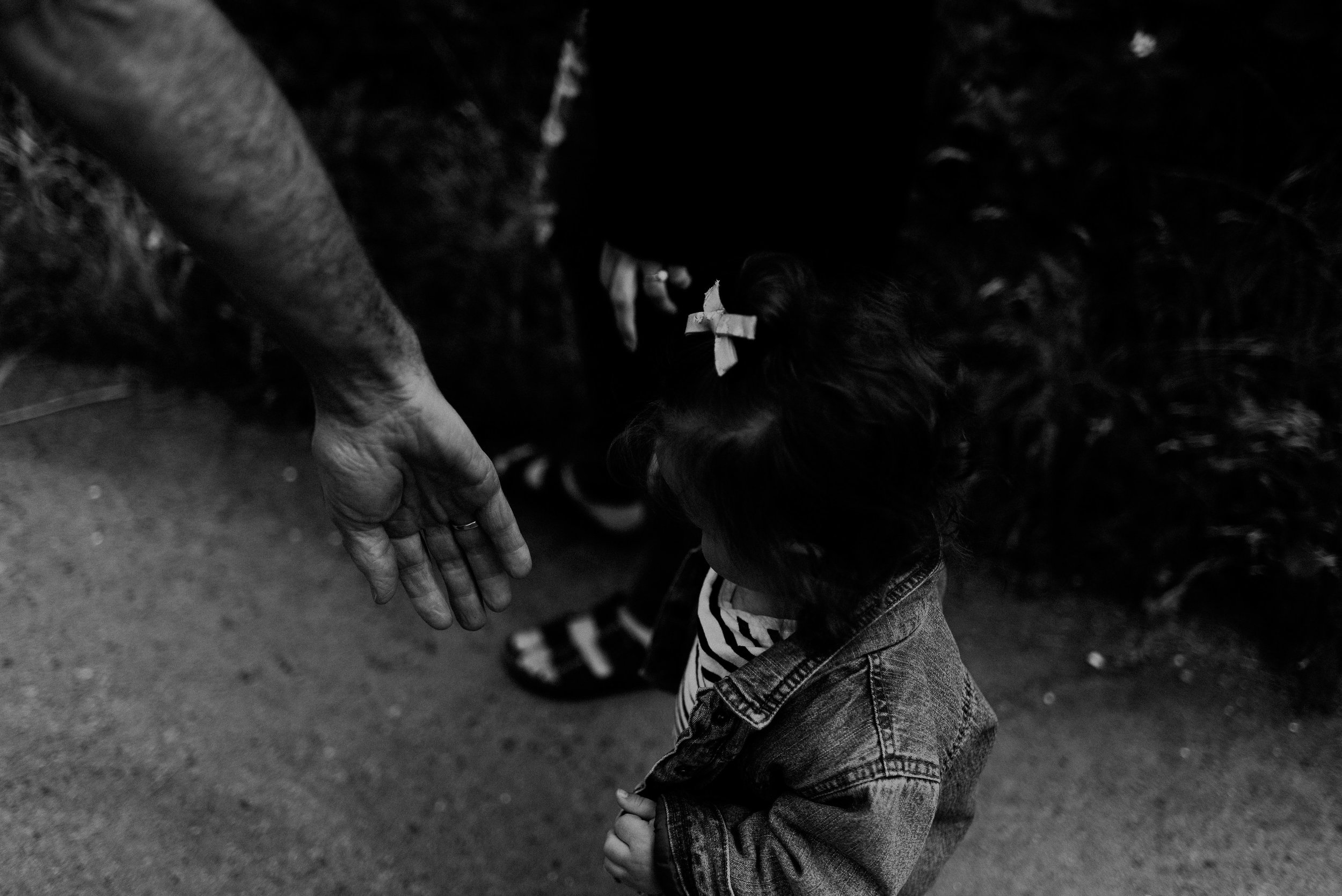;
Images by Brooke Richardson Photography
Suicide. What a heavy topic. Heavy but utterly N E C E S S A R Y to discuss.
This is becoming increasingly so, as we lose more and more beautiful souls to this tragic end.
A note about suicide, depression, and mental health in general: mental health is non-discriminatory and its prey comes from all walks of life. Just because you’re of a certain socioeconomic status, or have a specific number of friends, does not mean one is immune.
And it’s important to recognize and remember the role mental illness plays. It is said how selfish it is to take one’s life, considering the wake of devastation it leaves for the survivors. I can understand how some may feel like this - having someone take their own life is deeply heartbreaking - but think how desperate and hopeless that person must have felt to be driven to such an action?
I’m sure most - if not all - of us have been touched by suicide at some point in our lives, some of us multiple times, via a relative/friend/acquaintance/idol/etc. Hearing the news of an occurrence has a way of robbing your breath and halting you in your tracks. You immediately contemplate warning signs and contributing factors. You wonder how it could have been prevented and (depending on your relation to the victim) if there’s something you could have done.
That last part can be particularly brutal, depending on your closeness to the victim, literally/figuratively. Often, no matter how close you were, your mind feasts on what ifs. "What if I had reached out more often?” “What if I had been more patient?” “What if I had been more observant?” “What if I had been more generous with my time?” “What if I had been more empathetic/understanding?” And on and on and ON. Down the rabbit hole you go. Gnarly stuff.
I remember one person whose suicide I really took personally was of a guy who had expressed interest in dating me. He was unbelievably sweet and such a great guy, but there was no interest on my part, unfortunately. I did my best to break this as gently as possible, and then limited my contact with him so as not to lead him on. I was unable to emotionally provide what he wanted: a romantic relationship. The feelings just weren’t there for me.
As is common with tragedy, my memory blocked the details, but I vaguely recall suddenly thinking of him, whether through a dream or just a passing thought. It turns out, at the time he was crossing my mind, he was also taking his life.
I was shattered. I was wrecked with such a profound sense of guilt for not being there for him. Did I truly handle it the best way possible? Did my actions drive his loneliness over the edge, to the point he saw no use in living? Should I have been there more for him? What could I have done to prevent it? How selfish and awful am I?!!
Eventually I realized there are multiple contributing factors. Carrying that entire burden and regarding myself as the sole cause of his suicide was, in reality, self-absorbed. I was not the center of his universe, and I alone did not cause the outcome. Who knows what effect our interactions had on him, but I had to accept I did the best I could under the circumstances.
That sense of guilt and pressure lingered far after that event. Whether it was a friend, a boyfriend, or someone I was trying to help (especially if that someone wanted to leave the friend zone) it was considerably hard for me to draw those boundary lines (specifically if I knew they weren’t in the best headspace). Even if I effectively did set the boundaries, it resulted in countless nightmares and sleepless nights, with me worrying about them and stressing over their wellbeing.
I’m not sharing this to evoke a pity response. Not even. I tell my story to: 1) demonstrate suicide’s ripple effect; 2) relate to those of you with similar situations; 3) alleviate the burden you may place on yourself; and 4) raise awareness and provoke conversations on this crucial topic.
Some of you may relate to the yearning to help “heal” people. This is a beautiful intention and calling, but boundaries are essential. As I discussed in my 09.15.2018 post on boundaries, they are essential for true compassion (watch for an upcoming post on empathy).
“Be kind, for you know not of the battles people face.”
All we can do is our best. Our best to be kind to one another, to be considerate of each other, and to be there for one another. We must do our best to watch for red flags, and to regularly check in with loved ones. We all deal with our own daily thoughts/ideas/responsibilities whirling around in our heads, so this is a reminder for us all to step outside of our mental/emotional bubbles and stay keyed in to those around us: friends/relatives/acquaintances…even strangers. Just letting someone know you care is significant. A simple smile to a stranger can have a profound effect. Just acknowledging to people that you S E E them can make all the difference.
“Please, tell me.
I cannot help you fight the enemy
If you do not tell me about the enemy,
The enemy that is trying to kill you.
Do not trust your suicidal thoughts.
They are not rational.
They are a symptom, a sign, a cry from inside.
Something inside you needs healing.
Healing, not killing.”
Read full version of Letter from a Therapist to a Suicidal Person at:
http://www.speakingofsuicide.com/2014/05/01/letter/
RESOURCES
24/7 suicide hotline
Text GO to 741741 to speak with a trained crisis counselor
Call 1-800-273-8255 (National Suicide Prevention Lifeline)
Also online chat option
Veterans Crisis Line
Call 1-800-273-8255 (same number)
Also online chat option
Text 838255
B O U N D A R I E S
Images by Whitney Richardson Photography
Models Chelsie Conger (@xochelsieco) and Todd Conger (@toddvanclair)
“Compassion does not exist without boundaries.”
When I first heard this statement from the incredible Brene Brown, I remember feeling surprised and incredulous. Say what? What did boundaries have to do with compassion? It seemed like the most compassionate and empathetic people were “boundless” with their compassion and empathy.
Upon hearing Brene out, I was in full agreement with her assertion. Sing it, sister.
Brene notes she was also shocked to discover her research revealed the most compassionate people were the most boundaried. She defines boundaries as parameters for what is and is not okay.
According to Brene, establishing solid, defined, firm boundaries allows us to be compassionate and empathetic but not resentful. This is key! Having those boundaries prevents us from feeling drained, taken advantage of, and unappreciated.
Think about it! Tell me if the following scenario sounds similar to something you’ve experienced:
Someone asks you for a favor. Maybe it’s baby-sitting their kids, or lending your tool. You agree, only to have them stay out two hours past their expected return time, or totally trash your tool.
NOT OKAY.
If you’re not straightforward about your boundaries, including acknowledging when someone crosses them, this will affect your capacity for compassion in the moment. Whether you realize it or not, it affects you. Even by justifying their actions (“Oh, they’re just stressed - they needed some extra time” or “That’s okay, things are just things”) you repress your true emotions that naturally arise from having boundaries crossed. And repressed emotions don’t just magically melt away. No, that shiz stays with you and manifests itself eventually, and never in a good way. If you repeatedly repress emotions, they just fester and snowball. Notttt a good situation. You’ll likely experience physical AND mental AND emotional symptoms as a result.
So do both yourself and others a favor by speaking your truth. Define your boundaries. Let others know what is and is not okay. There’s no need to be abrasive and aggressive about it; you can be gentle yet firm.
Brene also offers the question: What if rather than trying to anger you/hurt you/use you/etc, people are doing the best they can? She shares her husband’s beautiful response powerful response to the question:
“I’ll never know whether people are doing the best they can or not, but when I assume people are, it makes my life better.”
Brene avers now she is not as sweet as she used to be, but she is far more loving. She states her question is B I G: What boundaries need to be in place for me to stay in my integrity to make the most generous assumptions about you?
Brene declares generosity can’t exist without boundaries, but acknowledges boundaries are not easy. We want people to like us/we don’t to disappoint people/etc. Brene asserts boundaries are the key not only to self love, but to treating others with loving kindness.
“Nothing is sustainable without boundaries.”
If you’ve done your work and set your boundaries, your empathy is infinite.
xx,
-w-
“Compassion minus boundaries is not genuine.”
PERSONAL * E V O L U T I O N
Images by Brooke Richardson Photography
“You are being presented with a choice: evolve or remain. If you choose to remain unchanged, you will be presented with the same challenges, the same routine, the same storms, the same situations, until you learn from them, until you love yourself enough to say “no more” until you choose change.
If you choose to evolve, you will connect with the strength within you, you will explore what lies outside the comfort zone, you will awaken to love, you will become, you will be. You have everything you need. Choose to evolve. Choose love.”
A friend asked me the other day if I've always been the way I am. (generally speaking). My response was no, I haven't been. Sure, I've always been independent and driven and disciplined. I've always been creative, I've always loved reading, and I've always adored fashion.
But I've definitely evolved.
Though I've always had a fire and open mind, I've learned to soften one and strengthen the other. (You should've met me when I was a walking paradox of a kid: extremely polite and sweet, yet a total and complete spitfire!) I learned to tame the fire (not extinguish - gotta have some!!!) but not be so hard on myself and others. I polished the rough edges, so to speak.
I learned to channel that fire more constructively. I learned to allow myself and others more grace, and realized all you can do is your best. In the words of the legendary Tony Horton, "Do your best and forget the rest." I learned to catch my breath every once in awhile, to celebrate victories and high five myself and others.
A key element to lasting happiness and success is our capacity to evolve. To not only recognize our areas for growth, but to act on them. It's not enough to just acknowledge where you could use some work. You must actually step up and do something about it. It's seductively easy to just cop out by saying, "That's just the way I am." Don't confuse self indulgence with self acceptance. You're doing yourself - and others - a disservice by robbing the world of your potential. Not only that, you're preventing your level-up and all the bliss and amplified success that brings!
To clarify: You should absolutely accept yourself where you are. You must love - not hate - yourself to improvement and happiness. It's much easier and more enduring and effective this way, TRUST ME.
But please don't just fall back on a mistaken "self acceptance" crutch. "I have a bad temper - that's just the way I am." "I'm a jealous person because of XYZ." "I lash out when I'm stressed." "I'm pessimistic - I've always been that way." First of all, snaps for acknowledging that. Second of all...whatchu gonna do about it??? In the nicest way possible, so what?! Why are you not doing something about it? What's keeping you from working on it? It's not about the hand you're dealt (we all have crappy cards in our stack - some more than others) it's how you play it.
As I discussed in an earlier post, we all have shadow sides. All of us have aspects about ourselves we and others may find less than desirable. What sets the truly happy and successful people apart from the unhappy and struggling people is simply the shadow work. Being willing and able to be honest with yourself and not let yourself off the hook. Being gentle and honest with yourself is a fantastic start, but it doesn't stop there. Why not take yourself as far as you can go?!
One of the attributes I like most about myself is my inclination to not only recognize my flaws, but to strive to eliminate/strengthen them. Very rarely do I have bad days or lasting bad moods, and I attribute this to my commitment to my personal evolution. I dig deeply to uncover why I have the struggles I do. I determine cause and effect, and reflect on ways I can mitigate/improve/eliminate these struggles.
“In every moment ask yourself: ‘What is the lesson being offered to me?’”
In the past, I was less than nice to myself during this process. My inner voice could be pretty scathing. What helped me transform it into an enjoyable (no, really!) process was to re-frame it! I simply accepted I'm a perpetual work in progress, so I might as well have fun on the ride. I praise my commitment to be my best self, and express gratitude for opportunities (disguised as frustrations/"failures"/annoyances) which highlight areas needing attention and allow me to become better. It's not always fun - there are discouraging moments, sure - but overall, knowing that I've come a long way excites, reassures, and invigorates me. I get pumped knowing my efforts are helping me become even better, happier, and more successful. They're allowing me to become my best me.
“Be kind, for everyone you meet is fighting a hard battle.”
This doesn't mean I totally condemn the Whitney of the past. I know she was doing her best with what she had. We all have to start somewhere, and we don't all have the same struggles. What's easy for you may challenge me, and vice versa, so don't get all judgy with yourself or others. All that matters is you're moving forward.
Happy evolving!
xx,
-w-
BEING KIND > BEING RIGHT
Images by Brooke Richardson Photography
Have you ever been talking with a group of people, and someone in the group starts spouting off a bunch of facts that aren'ttttt exactly true, and you feel compelled to set them straight? Or they start wildly embellishing a story, and you feel the urge to offer the, you know...TRUE version? Or maybe you're arguing with a friend, and they really messed up and dropped the friendship ball, and are getting defensive and combative when you call them out on it.
I don't know about you, but in situations like these, my hunger to be right is POWERFUL. They're wrong, and the world needs to know.
“I am practicing being kind instead of being right.”
The more I learn about life, the more I realize how inferior being right is to being KIND. Kindness trumps all. However, it should be noted: Kindness doesn't necessarily mean nodding agreeably when someone is spewing inaccuracies that could be harmful/hurtful to others/lead them astray in a significant way. But if your friend is regaling others with her tale of being up front at the Beyonce concert (when in reality she was sharing binoculars with you in the nosebleeds), what's the big deal? Does it hurt anyone? Why embarrass her in front of others, just to set the record straight?
“Not all truths need to be voiced”
What's more important is to focus on what's causing that person to act the way they're acting, and say the things they're saying. Why do they feel the need to bolster their credibility/image/etc? Are they feeling undervalued and depressed? Are they bumming about a rejection, in their personal or professional life? Are they insecure about their worth? Or in the example of them being a less than ideal friend, what led them to make that mistake?
“Open-minded people don’t care to be right. They care to understand. There’s never a right or wrong answer. Everything is about understanding.”
It can be really tough, but oh-so-more rewarding to check your ego and anger, and dig a little deeper. Dissolve your anger with kindness, compassion, and empathy. At least try to understand why they did what they did. If you do, it's actually a win win: It encourages a more peaceful and effective solution, which discourages repeat occurrences. If you can tease out the root of the problem, you can be the friend they need, and likely prevent it from re-manifesting (as suppressed, unresolved issues often do).
xx,
-w-
IT'S NOT ME IT'S YOU
Even if you're genuinely the sweetest person alive, you've felt frustrated by another person, right? Or you've gone after something sought by others, like a job, or a house...or even a parking space!
Let's say you and someone at work are competing for an opportunity. There is only one spot available and you both have your sights set on it.
On a basic level, what is your need here?
Spoiler alert: Your need is NOT for the opportunity itself. Depending on what the opportunity is, your need may be for financial security. It may be for growth and progress. It may be for acknowledgement of your hard work. That particular opportunity is a vehicle, or method, for fulfilling that need.
So ask yourself: Is there another way to get your need(s) meet without this specific opportunity?
YES!
You could get a promotion or an award. You could even change jobs or branch out on your own. You could find another source of income.
The point here is:
“No two people’s needs are ever in conflict. Only the strategies for getting those needs met are in conflict.”
Reflect on a recent conversation that could have gone better, or a conflict you experienced. Maybe you're battling with a significant other, or a friend, or a boss, or a customer service representative. Strip away the rest and drill down on what your common, basic needs are. Maybe it's the need to provide a cohesive, stable environment for your kids [spouse]. Maybe your needs are to feel supported and heard [friend]. Maybe you need to feel valued and trusted [boss]. Maybe the needs are efficiency and reparation [customer service rep].
Focus on those common needs and remember: at our core, we all have the same basic needs. What varies are our ideas for how to meet those needs. Some seek validation through fancy possessions and high socioeconomic status. Some look for love in toxic relationships. Some think hoarding what's "theirs" [time/money/ideas/energy] is the only way to ensure there's enough for them. Some of these methods work, and some not so much. Some are harmless, some are harmful - to self/others. Whatever your method is, try to choose one that serves the highest good. So let's do our best to remain open and empathetic to others as we navigate life and work on getting those needs meet.
“Negative feelings come from unmet needs.”
Anger could stem from a need for respect that isn't honored. Confusion could signal a lack of communication and honesty that are needed. Impatience could be from a need to be understood. Or lezbereal - maybe you're just friggin' HANGRY and need some F O O D!
Strive for internal and external awareness, and look for ways to meet those mutual needs. If you're ever in doubt regarding just what those needs are, do your best to communicate with an active ear and an open mind. If possible, eliminate assumptions and seek confirmation from the other person/people. Put down the gloves and halt the hostility. Sometimes opposition/competition is unavoidable (e.g. vying for a job, or spot on a team, etc) but at the very least, identifying those needs helps you relate to and empathize with the other(s).
One love,
-w-
F O R G I V E N E S S
Images taken by Abbey Armstrong Photography
Images edited by Brooke Richardson Photography
“Forgiveness means giving up all hope for a better past.”
Think about the last time you were physically hurt. You likely did something to address the pain, right? Popped an aspirin, threw on a rad Power Rangers Band-Aid (because everyone knows cool BandAids are more effective than regular, boring Band-Aids). Even if you try to avoid medicine, you probably took some measure to ease the discomfort (cold washcloth/rest/essential oils/etc). How long did you wait to do something about it?
In her book You Are A Badass, author Jen Sincero brilliantly articulates the power of forgiveness. She highlights the distinction between how we typically treat physical pain as opposed to emotional pain. As she notes, we're typically very proactive and quick on the draw to banish our physical pain...even if this involves the initial discomfort of pouring stinging disinfectant on an open wound or powering through getting stitches. We're motivated to do it right away, because we're intent on our ultimate goal of R E L I E F.
“They caused the first wound, but you are causing the rest; this is what not forgiving does. They got it started, but you keep it going. Forgive and let it go, or it will eat you alive. You think they made you feel this way, but when you won’t forgive, you are the one inflicting the pain on yourself.”
However, when it comes to emotional pain, we're apparently down to see just how much torture we can endure, wallowing in our "guilt, shame, resentment, and self-loathing, sometimes for entire lifetimes." Ring any bells?
“Holding onto anger is like drinking poison and expecting the other person to die.”
We prolong our misery by clinging to our ill feelings. We do this by badmouthing our boss/fantasizing about telling our overbearing mother-in-law where to stick it/pondering the many reasons our enemies are wrong and the many reasons we're right. As Sincero points out, we relive our worst moments over and over and over instead of letting them go. Doing so, we pick at the emotional scabs, thereby refusing healing and preventing the pain from subsiding.
“Reminder: Forgiveness is a process. A choice you have to make over and over, until you’re free from the negative feelings.”
I'm sure this isn't the first time you've heard this. We all know we should release our resentments and let that shiz go. It's one thing to know it - it's another to do it. And I can completely relate. I'm definitely not immune to the self-inflicted pain by clinging to past wrongs others have done me, particularly the big whammies. Through effort and mindfulness it's become much easier, but I still have my moments. Rarely do the negative feelings immediately dissolve upon deciding to forgive. They can linger, sometimes re-surfacing after you thought you'd fully released them. Depending on the severity of the wrongdoing, forgiveness is usually a process. A decision you have to make repeatedly. Be patient with yourself and know it's okay if you occasionally get sucked back into the angry/hurt vortex - all that matters is that you find your way back out.
“When someone does something wrong, don’t forget all the things they did right.”
We all have our own stories of people royally screwing us over. It's life. We've (unintentionally or otherwise) done wrong by others. Here's what I remind myself to make the process easier:
- Being a human is hard sometimes, and a little grace toward someone goes a long way. Hurt people hurt people.
- I'm so grateful for the forgiveness others have extended to me. Who am I to withhold it from others?
- it's friggin' EXHAUSTING to hang onto hurt/anger/resentment.
- Empathy, understanding, and compassion dissolve anger/guilt/resentment. I always try to understand why the person did what they did - every time, I'm able to trace it to fear/insecurity/hurt the other person is feeling. This immediately reminds me of our collective humanity, and effectively softens my heart toward them. This doesn't mean you condone their actions, but it allows you to empathize, accept the situation, and move onnnn.
- People fight battles we know nothing about.
- Jumping to conclusions and automatically assuming ill intent often proves wrong. Allowing the person the benefit of the doubt is usually the best tactic. If possible, communicate with the other person to express your concern and provide them with a chance to explain themselves.
- It's often not about you. Step back and be honest with yourself: Are you allowing your insecurities to color your judgment?
IMPORTANT NOTE: This also applies to self-forgiveness!! Be kind to yourself! Forgive yourself for your own indiscretions and slip ups, and be patient with yourself as you work to forgive others.
xx,
-w-


































